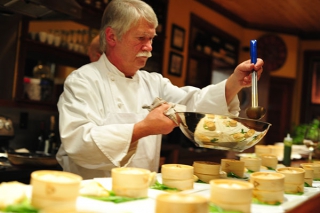
Culinary Education Takes the Lead
04 September 2018Culinary programs can drive ideation around issues like sustainability, health and urban redevelopment. Education as the driver not passenger.
By Paul Sorgule, MS, AAC
What is the larger role of culinary education? Do we have a responsibility to the food industry that goes beyond teaching cooks and future chefs?
Many other educational disciplines invest time and energy in research that supports progress and problem solving in the fields they represent – why isn’t this true in culinary education? Should we take the lead in helping to define what the business of food will be like in the future?
What would it take for the food industry to begin relying on institutions of culinary education for solutions and new directions? We have become effective service providers as educators mold a new generation of foodservice professionals; it may be time for us to take on an even larger role.
With our experience and resources, I would implore each of you to look at how we might address the following significant issues food-related industries are facing. It will be the solutions to these challenges that set a course for ongoing growth and success.
“If you have an opportunity to help others or incite change, it feels like a moral obligation to do so." Elizabeth Chambers
Fragile Financial Nature of the Restaurant Business
Working with technology professionals we might consider helping to develop user-friendly tools that can help chefs, managers and restaurateurs better monitor and manage fragile resources. This will set the stage for efficiency and effectiveness geared toward minimizing costly mistakes and maximizing profitability. When restaurants succeed so too do those young people that we dedicate time to teach and train.
Labor Crisis in the Restaurant Business
This challenge, above all else, must be resolved through collaborative assessment and ideation involving educators, restaurateurs, chefs and managers, and companies that service the more than 1 million free-standing restaurants from coast to coast. Finding ways to strengthen the potential for profit, developing methods and systems for controlling costs, developing products that are more stable, and promoting the advantages of reasonable portion sizes to American consumers should be part of our job description. Until our industry can pay a fair wage, offer reasonable benefits, and find a way to build healthy work/life balance for those who tie on an apron, we will not be able to ensure a successful future.
Integrity of the American Food Supply
Science and art can co-exist and should, but never at the expense of quality, safety or positive public perceptions. As moderators and a research body, culinary educators can serve as a portal for civil and effective dialogue and validated research in the process of bringing these issues to the table and helping to address the right approach for the American food industry.
Agriculture, Ranching, Fishing, and Sustainability
As American farmers, ranchers, and fishermen continue to develop ways to address the growing demand for quality, fresh, flavorful, and safe ingredients there must be effective consideration for how we can protect those ingredients and the people who consume them. Culinary education might serve as an effective portal for valuable information to guide consumerism. Our students can and should become the ambassadors for sustainable practices and the food industry should look to us for additional guidance.
Health, Wellness and What We Eat
We know the relationship of food to health and wellbeing and thus we must take on the responsibility of teaching others and sharing what we know with students, restaurateurs, chefs, food companies, and consumers. Advocating and investing time and energy in helping to create a stronger emphasis on healthy habits in cooking and eating is a responsibility we share.
Logistics and Delivery and the Challenges of Restaurant Real Estate
In more and more cases, it is the cost and challenges of managing and paying for a physical location that drive restaurants out of business. Should we not invest time and energy in helping restaurants build common sense financial relationships with landlords, and the communities where restaurants play such an important role?
Restaurants as Urban Renewal Catalysts
When failed communities contemplate renewal – bringing life back to once vibrant neighborhoods that fell on bad times – it is that first daring restaurateur who opens a door and kicks renewal into gear. When those same communities benefit from this first step and over time experience a remarkable rebirth, it is discouraging to see those same landmark restaurants suffer from aggressive increases in rent leading to closure. Could culinary institutions help define more appropriate lease agreements that view the restaurant as a means to urban renewal that is worth protecting and encouraging?
Hunger in America
No other contemporary issue is more important for those of us in culinary education than that of hunger in America and beyond our borders. In a country that has so much it is not acceptable that any person feels the pain of food insecurity - 41 million Americans suffer from the challenges of hunger. While we teach our students how to be superb technicians and effective entrepreneurs, we owe it to them to be the strongest advocates for caring for others and finding ways to help others learn how to cook, have access to good ingredients, and feed their families. This is an obligation we all share.
Whatever we do in this regard will benefit those students who grace our classrooms and kitchens. Our job is to create and sustain an environment for learning whether it is on our campuses, in kitchens, restaurants, farms, ranches, fishing craft, processing plants, or local soup kitchens. Think about the possibilities.
PLAN BETTER – TRAIN HARDER
Paul Sorgule, MS, AAC, president of Harvest America Ventures, a mobile restaurant incubator based in Saranac Lake, N.Y., is the former vice president of New England Culinary Institute and a former dean at Paul Smith’s College. Contact him at This email address is being protected from spambots. You need JavaScript enabled to view it..
